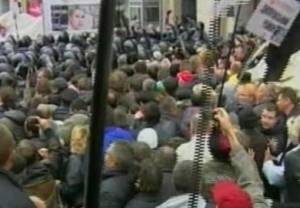Lawyers: new rules on detention long-needed but not enough

As reported, the Constitutional Court last week issued a judgement confirming that a person may only be held in custody without a court order giving the grounds for 72 hours whether in administrative or criminal proceedings. It also stated that the police do not have the right to detain people for disobeying their orders.
Fedir Venislavsky, lawyer and specialist on Constitutional Law: “According to Article 29 of the Constitution, a person cannot be detained or held in custody without a substantiated court order for more than 72 hours. On the basis of this norm, the Constitutional Court found unconstitutional those provisions of the administrative code which envisage the possibility of exceeding this three day period.”
The Constitutional Court found that detaining a person for not obeying police officers did not comply with Ukrainian legislation since the Code of Administrative Offences imposes punishment only for malicious disobedience. However it was this point which aroused dissatisfaction among the lawyers spoken to. There is no explanation anywhere of what in fact constitutes malicious disobedience. They say that therefore the police can classify the actions of several people, as happened during the protests over tree felling in Gorky Park in 2010, to suit themselves. According to witnesses activists who showed no resistance were arrested specifically for malicious disobedience. Yevgeny Solovyov says that the same thing happened this year when people who had not only not shown resistance, but had themselves called the police to the scene of the illegal tree felling, were taken to the police station.
Yevgeny Solovyov, lawyer: “Very often the police simply don’t process the detention or do so later, after the fact, saying that people virtually turned up themselves, that they were invited, not detained, and so forth. This is what happens and unfortunately only one element of that unlawful practice has been removed.”
In the last cases the court acknowledged that the police had not presented proof of malicious disobedience from those detained and refused to consider administrative charges. Yet the police themselves, Solovyov says, despite an approach to the Prosecutor’s Office, were not punished in any way for their unlawful actions.
Furthermore, the experts say, the Constitutional Court established other opportunities for abuse by law enforcement officers. For example, the Code of Administrative Offences says that detention is counted from the moment that the protocol is drawn up, and people who are inebriated, from when they sober up. The Court’s judgement found deferments unconstitutional, but did not define clearly at what moment arrest begins.
Ludmila Klochko, Kharkiv Human Rights Group: “Here in the Law on the Police it says from the moment a person is brought in for a protocol to be drawn up. How long did that “bringing somebody in” last, and what forest they took him through so that he’d know who he has to deal with is not set out in legislation. Custody should be from the moment when a person ceased to be able to freely go away, return and never see anybody. From that moment, and although in the motivation part there is explanation of why, the judgement does not speak of this”.
The specialists believe that the Constitutional Court judgement could become an important argument for proving unlawful detention and that it wasn’t counted from the right time. However the problems for a person deprived of his liberty more often arise specifically during the first hours of contact with police officers. Therefore, in order to not give the police unnecessary grounds for detention, the lawyers advise people to have ID with them, especially in the case of people taking part in a protest action, and to try to inform their family immediately of their meeting with the law enforcement officers.





